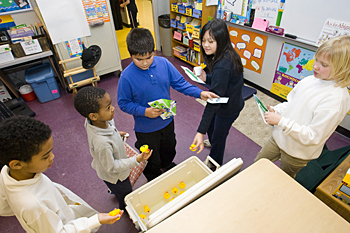Grades 2-5 set up their own businesses and all but sold out, Thursday, March 13, when students opened their own mini-marketplace, manufacturing products that they sold for “Blue Hen Bucks.” They set up makeshift kiosks, selling everything from brownies to football training skills.
The mini-marketplace is part of a College School social studies project called “mini-society” in which students establish their own classroom societies, earning their own currency--Blue Hen Bucks--and set up their own businesses. Along with learning the basics of economics, the kids learn how to target a market, select a product for that market, price it to sell, raise capital to buy materials, manufacture or produce their product and advertise.
Sarah earned money doing her homework. Emily got her completed assignments signed by the teacher, earning enough money to buy materials to knit scarves, which sold out almost immediately. There were kiosks sporting fancy pretzels and brownies, door hangers, bracelets, fudge, pet rocks, popcorn, cookies, seeded plants to grow peas, beans and tomatoes.
One budding entrepreneur had a wood building place where people could make things out of pieces of wood and nails that he supplied. Another student sold post cards of the horses and dogs his parents rescued.
Andrew had a take-a-picture, build-a-bookmark stand in which he took his customer's picture with his camera/printer, then attached a series of picture-booth-size photos to a vertical piece of cardboard to create a bookmark. Nick offered a service. For a few Blue Hen Bucks, he would teach his customer basic football skills.
Jeanne E. Geddes-Key, the Emily L. Phelps Director of the College School, was an enthusiastic customer. She said this was the fourth year for the mini-marketplace, which is intended to give students interactive experiences with the financial realities of the real world.
James B. O'Neill, director of the Center for Economic Education and Entrepreneurship at UD, developed the mini-society concept in the 1990s as a hands-on learning experience for elementary school students that involves them in entrepreneurial projects by having them develop, produce and market a product.
Article by Barbara Garrison
Photo by Kevin Quinlan


